|
|
|
Sort Order |
|
|
|
Items / Page
|
|
|
|
|
|
|
| Srl | Item |
| 1 |
ID:
158203
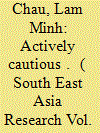

|
|
|
|
|
| Summary/Abstract |
This article uses the case of a northern Vietnamese village to explore how rural households in Asia have negotiated both the opportunities and challenges of marketization and capitalist industrial modernity. I focus on the Vietnamese state’s push to marketize village livelihoods by means of mass establishment of industrial parks comprising largely Foreign Direct Investment factories in the countryside. The state expects young villagers to abandon low-value agricultural livelihoods and treat factory work as their only livelihood strategy and the lifetime warranty of their well-being. Yet while young villagers have been responsive to new opportunities of industrial employment, they have all treated factory work in ways very different from what the state expects: merely as one of their household’s diverse portfolio of livelihood options. I argue that villagers have handled the encounter with industrial modernity in ways rarely documented in the literature on marketization in rural Asia: as ‘actively cautious’ decision-makers, who actively pursue industrial employment to improve their family’s living standards, and carefully maintain a portfolio of livelihood strategies to protect the family’s well-being from the many insecurities of the industrial workplace.
|
|
|
|
|
|
|
|
|
|
|
|
|
|
|
|
| 2 |
ID:
158206
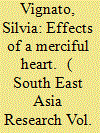

|
|
|
|
|
| Summary/Abstract |
In this article, I examine the relationship of charitable help that, through the persons and the work of caregivers, connects some donors to the young persons who grow up in home-based childcare institutions in contemporary Malaysia. The prism of my analysis is the small charity functions that take place within the homes that I have studied, which allow donors and receivers to elaborate, perfect and enact moral ideas of themselves and of their place in society. Because they stage the main characters of charity, the functions also give an insight into how, since an early age, children actively explore the dominant and largely ethnicized model of virtue and merit they are summoned to embody, thus making sense of their shared condition of “charity children”. This self-care work, I argue, inspired by Erica Bornstein’s study on Indian charity, is made possible by the “pure gift” core that characterizes donors and caretakers, as it frees the aided children from the necessity to “buy” their care back, which is otherwise requested in traditional child fostering.
|
|
|
|
|
|
|
|
|
|
|
|
|
|
|
|
| 3 |
ID:
158205
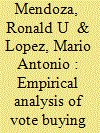

|
|
|
|
|
| Summary/Abstract |
Recent literature suggests that the poor are more likely to be targeted for vote buying and to sell their votes. However, there is limited empirical analysis on the patterns of vote buying among low-income voters. This paper attempts to fill this gap using a survey conducted in Metro Manila, Philippines after the 2016 elections. Data analysis shows that vote buying among the poor is indeed very common, but the incidence varies depending on the vote buying type. The most prevalent form uses more benign goods such as food and clothing, but offers of money is still reported by more than a quarter of respondents. Different vote-buying types also have different correlates, including some socio-economic factors, suggesting that it is a finely targeted activity. In addition, money vote buying is predominant in tight elections, but buying votes using non-monetary offers is more common when there is a clear winner even before the election. Most of those who were offered accepted the goods or money, but only about two-thirds voted for the candidate. In addition, evidence suggests that the good or money is not the deciding factor in voting for the candidate. This supports the premise that vote buying is just part of a bigger effort by politicians to build clientelism and patronage among his/her constituencies. Dependency and loyalty is merely punctuated by election-related transfers, rather than an effort to completely change votes.
|
|
|
|
|
|
|
|
|
|
|
|
|
|
|
|
| 4 |
ID:
158202
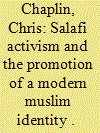

|
|
|
|
|
| Summary/Abstract |
Indonesia has witnessed the emergence of a market of Islamic goods, services and media platforms that have catalysed a qualitative shift in the ways individuals come to express their religious convictions. Salafi Islam is no exception to this transformation, and this article provides a case study of contemporary Salafi propagation amongst Yogyakarta’s students and graduates. Through description and analysis of campus based religious lectures, websites, magazines and fashion outlets linked to the al-Atsary Islamic Education Foundation, this article explores the intricacies of campus affiliated da’wa. Linked to a ‘literalist’ interpretation of Islam reliant on scholars in Saudi Arabia, Salafism is frequently denounced as foreign to Indonesian norms. Yet, while activists do indeed promote a rigid adherence to Islamic tenets, they also align Islamic values to concerns with a modern Muslim identity. By framing Salafism as sensitive to ideas of professional employment, while juxtaposing it against images of a less well-educated rural Islam, they have thus have created a unique strand of urban Salafi propagation.
|
|
|
|
|
|
|
|
|
|
|
|
|
|
|
|
| 5 |
ID:
158204
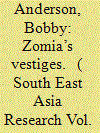

|
|
|
|
|
| Summary/Abstract |
Opium poppy cultivation in Thailand fell from 12,112 hectares in 1961 to 281 hectares in 2015. One outlier exists: Chiang Mai Province’s remote southwestern district, Omkoi. Ninety percent of the district is a national forest reserve where human habitation is illegal. However, an ethnic Karen population has lived there since long before the law that outlawed them was created, unconnected to the state by road, with limited or no access to health, education and other services. Omkoi’s Karen increasingly rely on cash-based markets. Their lack of citizenship precludes them from land tenure that might incentivize them to grow alternative crops, and their statelessness precludes them from services and protections. Nor is the Thai state the singular Leviathan that states are often assumed to be; it is a collection of agencies and networks with divergent interests, of whom one of the most powerful, the Royal Forestry Department, has purposely made Omkoi’s population illegible, and has consistently blocked the attempts of other state actors to complexify Omkoi beyond the simplicity of its forest environment. These factors make the state illegitimate to Omkoi’s Karen just as Omkoi’s Karen are illegitimate to the state, and make the cultivation of short-term, high-yield, high-value, imperishable opium a logical economic choice for poor Karen farmers, especially given the historical lack of law enforcement presence. However, that presence is growing, as Omkoi becomes one of the last areas of Thailand to experience the historical extension of lowland Padi state power into an ungoverned, untallied highland.
|
|
|
|
|
|
|
|
|
|
|
|
|
|
|
|
|
|
|
|
|